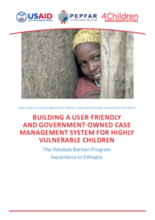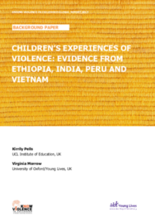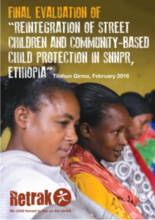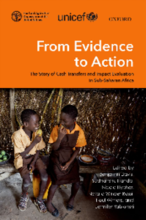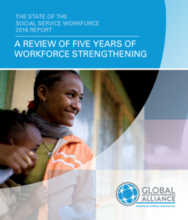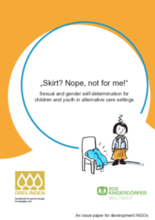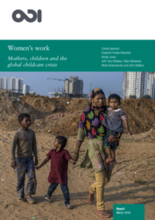childrens_living_arrangement
children_living_without_bio
Displaying 31 - 40 of 70
This case study describes the coordinated care and case management system for highly vulnerable children and their caregivers implemented by the Yekokeb Berhan program in Ethiopia.
This study explored the extent to which components of quality of care predicted psychosocial well-being of orphaned and separated children (OSC), as well as the extent to which these components of quality of care and demographic factors moderated the associations between care settings and psychosocial well-being of orphaned and separated children (OSC).
This brief paper highlights some of Young Lives key findings on violence affecting children, exploring what children say about violence, how it affects them, and the key themes that emerges from a systematic analysis of the children’s accounts.
This document is an evaluation of Retrak’s reintegration of street children and community-based child protection project in SNNPR, Ethiopia.
This issue brief from the UNHCR highlights key messages from UNHCR in regards to family tracing and reunification. The brief outlines the importance of children growing up in a safe family environment and the positive impact this has on a child's psychological, cognitive and physical development. In the best case, alternative care is only required as an interim measure while family tracing is carried out and until the time when children can be reunited with parents or family members.This brief is part of a series developed by UNHCR which aims to guide field operations on key thematic child protection issues.
This book published jointly by FAO, UNICEF, and Oxford University Press presents the findings from evaluations of the Transfer Project, a cash transfer project undertaken in the following sub-Saharan African countries: Ethiopia, Ghana, Kenya, Lesotho, Malawi, South Africa, Zambia, and Zimbabwe. It concludes that cash transfers are becoming a key means for social protection in developing countries.
This report captures what has been accomplished in social service workforce strengthening in eight countries in Sub-Saharan Africa and highlights areas for future intervention. Progress made to strengthen the social service workforce within these countries is useful when reflecting on global trends and ways forward.
In this research paper Asnakech Tesfaye explores the expectations of Ethiopian children applying for an Australian Orphan Visa. Tesfaye’s research found children applying for visas expected to get better education, employment, material benefits and living conditions.
This issue paper explores the experiences of lesbian, gay, bisexual, transgender and intersex (LGBTI) children and young people in alternative care settings and highlights some promising practices.
This report and summary explores the current childcare policy failures across a range of case-study countries, including Viet Nam, Gaza, Mexico, India and Ethiopia, and highlights examples of progress in countries which are successfully responding to these challenges.

